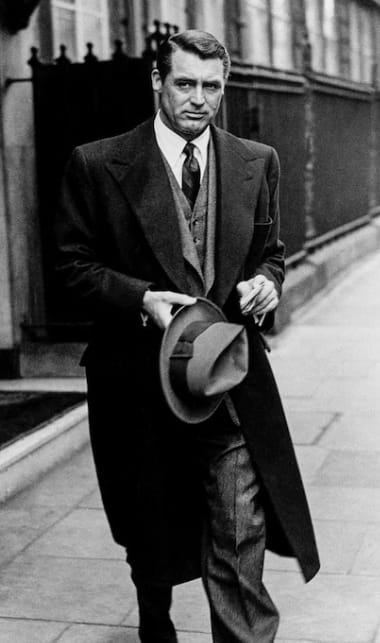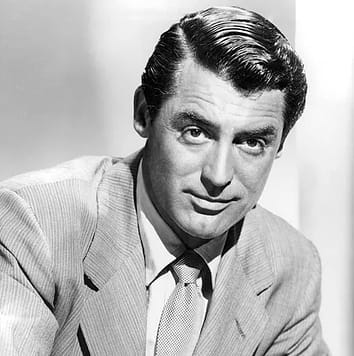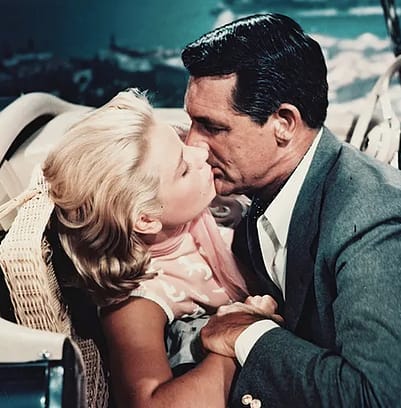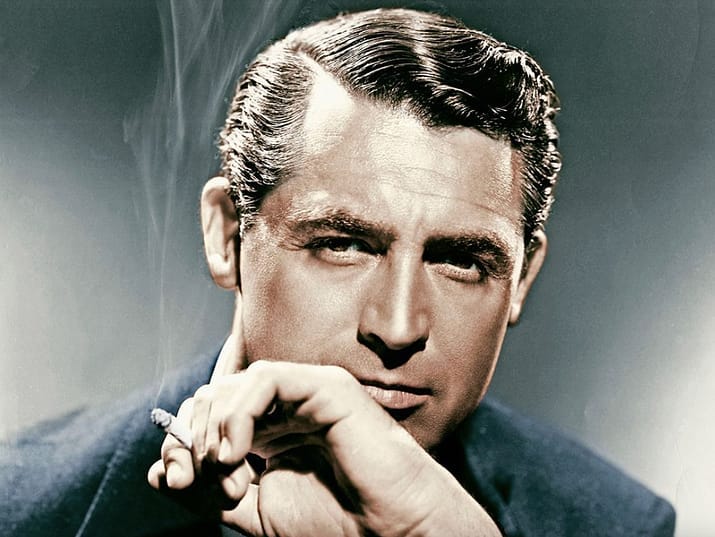From Archie Leach To CARY GRANT – An Unlikely Path To Hollywood Stardom
One of the most popular gossip publications during the Golden Age of Hollywood was Modern Screen.
I found a story in a 1933 issue of one of the pdf versions that discusses Cary Grant’s life in a way I have not heard before.
It’s about Cary Grant’s early life when he was known as Archie Leach. The article gives some possible reasons behind Grant’s bisexual proclivities.
Below is the story – verbatim – which can be found in this issue of Modern Screen.
It’s an interesting look about a man so many of us found alluring, charismatic and the epitome of gentlemanly masculinity. I hope you like it as much as I did.
***
When Archie Leach was about three and a half years along in life, somebody in the family decided to bathe little Archie in the kitchen.
A portable bathtub was brought in and set in the middle of the room near the stove for warmth.
In humiliating view of the entire family, Archie Leach was stripped and bathed. So outraged was his young modesty that he screamed for hours.
“That is not only my first memory of how humiliating life can be,” grinned Cary Grant (who is that same Archie Leach twenty-six years later), “but it is also the first time I have ever seriously objected to an audience!”
Practically from the very beginning, Cary Grant has been surrounded by an audience of some sort.
Even in his most impoverished moments, which most of us spend in boring seclusion, Cary, a stilt-walker, was being followed about by swarms of people holidaying at Coney Island.
In another financially embarrassing interlude of his life, he slept at nights stretched out on a desk in the outer office of an actor’s agent and friend in New York. Eyen in his sleep, he was exposed to the scrub women and the janitors.
When a fickle fate finally smiled on him, he knew the large audiences that patronize New York shows, and later the even larger audiences of the screen. The life of the proverbial goldfish has been private compared to the life of young Archie Leach, the juvenile public bather.
Cary Grant’s Early Life…
Archie Leach was born in Bristol, England, on January 18, 1904. His parents were Elizabeth and James Leach. There had been one other child, older than Archie, who had died in his first year. His father was a clothing manufacturer of medium circumstances.
They lived in an eight-room house in the outskirts of Bristol, a thriving town of about 300,000 souls, 120 miles from London. They were a happy and modestly prosperous little family.
An enormous garden of hollyhocks and apple orchards surrounded the house. In the evenings, Jim Leach would take his young toddling son with him into the garden and, with a pipe glowing in the twilight, talk to him quite as though he were old enough to understand what he was saying.
The first words Archie ever spoke were to his father.
One evening he asked, to the delight of Jim Leach, “What’s your name?”
“Jim,” replied his father.
From then on Archie Leach never did, and never has, referred to his parent by any other title than Jim. They were buddies from the moment he could talk.
WHEN Archie was four he was entered in school, even though he was a year short of English school requirements, because Jim figured he was a year smarter than the rest of the children, anyway.
It was Bishop’s Road school and before he learned his a, b, c’s they taught him to recite “Up In a Balloon So High.” Because he learned it faster than any of the other children, he was invited to stand up and recite it to the class in “honor recitation.”
For this extra special occasion his mother made him a Fauntleroy suit and the four-year-old Archie faced his first professional audience with flying colors.
At the ripe old age of six, Archie acquired a romantic audience of one, a Miss Edna Smith, “six going on seven,” plump daughter of the local butcher. Archie’s method of wooing was to show off in front of Edna. He did nipups, nobs and handsprings for her exclusive entertainment.
But if she was entertained, she never said so. She merely watched in phlegmatic calm and nursed on a lollypop that was inseparable from her mouth.
One day, in the hope of eliciting some sort of oral comment from Edna, Archie “walked the fence” with a bowl: of hot soup juggled on his head. Just when the lady was on the verge of actually removing the lollypop and saying something, Archie got so excited at a sign of life in his love, he lost his footing and landed hard on the other side of the fence.
Edna walked away in disgust and never again returned to watch his antics. Thus died his first romance.
From Bishop’s Road, Archie went to private school, Tellesford House, and from there to Fairchild Academy, where he stayed until he was twelve.
The death of his mother when he was ten and Jim’s subsequent marriage to another woman, marked strictly the ending of his real kid days. The little “world for three” that had been so peaceful in the hollyhock garden was gone for good and with it had come a strange and different new world further complicated by England’s first year’s participation in the World War.
When the war broke out, the boys of Fairchild Academy were organized into a Cadet Corps. And theirs was a real and active participation of “helping the boys.”’ As a full-fledged member of the Cadet Corps, he volunteered for “service” in Southhampton where, along with other “older” (twelve to thirteen years of age) cadets, Archie handed out life belts to the real soldiers as they went on the small boats.
The cadets were called “official demonstrators.” They would wear a belt and then demonstrate to the soldiers just how they were to be buckled and strapped in the least possible time. When the cadets were not at Southhampton on their “demonstration” jobs, it. was part of their school work that they were to run official messages and otherwise make themselves useful to the service.
THREE years passed.
Bristol was constantly threatened by air raids. The boys of the Cadet Corps had been detailed to turn off certain lights assigned them during these times of great danger to the town.
When an enemy plane was reported nearing the city, a siren would shriek warning and the cadets would jump outit of bed and do their duty by the lamps, and then run for their lives to the cellars.
It was thrilling, exciting, horrifying duty for young boys. But to Archie Leach it was the entire reason for his existence.
He took great pride, that though his “nine lights” were two miles away from his home, they were often the first to go dark, assuring that neighborhood of his protection, the best he could give.
One night he had been particularly tired when he went to bed. Cary was sleeping in a bunk bed with a pal who was no less a personage than Douglas Fairbanks, Sr. made his first crossing on the Olympic.
Grant and Fairbanks were cadets together.
He nearly popped with excitement when he discovered Doug was on board. He slept so deeply he did not hear the warning sirens until: his father came to waken him. They had been going for three dangerous minutes, and he had not heard them!
It was a cold, moonless night. The boy was beside himself as he grabbed only the protection of his cadet coat before leaving the house. The sirens shrieked louder and longer, the raid was drawing closer and closer, his lights were two miles away!
Cary’s little child’s body was thin and racked with raw sobs as he ran and stumbled toward “his lights.” Suppose all the other lights in the town were already turned off, and only his remained to mark the city for the enemy.
Faster and faster he ran, and never had the distance seemed so long. His teeth chattered with the cold, but his body seemed consumed with a burning fever. He was blind with tears and sick at heart. In his kid-like exaggerated fright, he pictured himself responsible for the destruction of a neighborhood of his townspeople, perhaps of the entire town.
When he finally reached his “lights” and dimmed them, he was on the point of collapse. For ten minutes he lay crouched against a house straining every nerve to catch the whir of those horrifying motors. He hardly dared to breathe. In the far distance he heard bombing, but he smiled to himself. His educated ear told him that the raid had missed its mark by many, many miles.
But Bristol was not always so fortunate in escaping the many air raids, in spite of the vigilance of her cadets. On one terrible occasion tragedy hit very close to Archie Leach’s home.
Reg Bolton, a famous comedian in England at that time, lived next door to the Leach’s. During one of the raids, Bolton’s wife, out of curiosity, stayed outside rather than running for the cellar as the others did. The result was that she was decapitated by a bomb that was dropped ten feet from where she was standing.
Cary would see more red years of war; then the Armistice; the confusion and bewilderment of adjusting life once again to normal after those hysterical, horrible, and yet somehow thrilling days of the war.
Such customarily exciting events as ‘‘the first pair of long trousers” and the first “mixed party,” in which self-conscious white flanneled young “men” invited self-conscious be-frilled young “ladies” for a dance, seemed anti-climactical to young Archie Leach.
He had grown into a strong, dark, extraordinarily handsome boy. He had plenty of bids for dances and social events from the smitten young débutantes of the town. But women and social life had become very unimportant to him. During his remaining school days at the Academy he went in for all forms of athletics. He became an outstanding stunt athlete.
Later, his ability at handsprings, high-jumps and stilt-walking was to tide him over a very bleak period of his life in far-away New York.
In the meantime it was just a hobby which he alternated with his “chosen profession,” electrical work.
At school nothing fascinated him as much as the electrical lab. He loved to experiment with lights and particularly with lighting effects.
Whenever a musical comedy would come to town, Archie would work himself in backstage, mostly through a desire to watch the electrical appliances.
Once he made quite a hit with the head electrician by offering a very effective suggestion about colored lights.
It was through this contact that Archie got his first taste of the stage, the only interesting, exciting life he had discovered since the war.
The electrician gave him a job as an assistant, but more exciting still, when the troupe left for Norwich, Archie got a small part (no lines to speak, but plenty of pantomime). Archie might have gone on to develop into the Boy Barrymore of rural England if Jim (and a rather irate Jim, too) had not come to Norwich and forced his budding genius son to return to Bristol and his school work.
Reluctantly Archie was enrolled in Clifton College, which should have been a rather agreeable adventure considering that Benita Hume sat right in front of him during history session.
But, though Archie and Benita talked over daily lessons and scholastic assignments, not even the slightest romance developed between the two youngsters, who were destined to meet again in distant Hollywood ten years later.
“I SIMPLY was not interested in girls,” said Cary Grant explained of Archie Leach of those unhappy college days.
“My short experience with the traveling troupe had made me restless to be about more exciting adventures of life than schooling, or school boy romances. I spent my spare time practicing handsprings, stilt-walking and acrobatics of all kinds and descriptions.
At the end of three months in Clifton, Jim was convinced that I was getting no good out of it. He permitted me to write the troupe asking if there was another opening for me, and when they replied that they could use me as a stilt-walker during their engagement at the Hippodrome in New York City, I was so overjoyed that Jim finally broke down sand said I might accept.”
Archie was sixteen years old when he came to America for the first time. He crossed on the Olympic and, thrill of thrills, Douglas Fairbanks, then king of the movie world, was aboard. Young Archie immediately hooked on as close to the fringe of Doug’s entourage as possible.
He literally shadowed the movie athlete about deck, listening to the amusing anecdotes he told and watching his physical feats with the widest-eyed admiration. When Doug discovered that his young fan was himself quite an acrobat, they spent hours in the ship’s gym performing stunts and chinning exercises.
New York proved to be the most exciting and glamorous place Archie had ever seen.
When he was not walking on his fourteen-foot stilts across the stage of the Hippodrome, he was touring the city from the Bronx to the Battery. One very serious accident marked the Hippodrome engagement.
During an evening performance the strap around his right foot broke and, after trying desperately to hop off the stage on one stilt, he lost his balance and fell headlong among a group of chorus girls.
Two of the girls were slightly injured and the ligaments of his leg were badly wrenched.
During his convalescence another stilt-walker was engaged, which meant that he was left high, wide, but not so handsome, practically broke in New York.
he manager of the troupe, taking pity on the boy, finally offered to pay his way back to England and his family.
He accepted the money, but he did not return to England. Instead he nearly starved to death. Evidently there were no other shows in New York that needed stilt-walkers or even a good acrobat.
Archie tried selling neckties and books, but these commodities, too, were apparently on the “no can use” list with New Yorkers. He had no friends in America. There was no one the lonely boy could turn to for help. He was intensely miserable and hungry for nearly three weeks before someone put him on to the idea that he might get a stilt-walking job at Coney Island where stilt-walkers were often engaged for advertising purposes to catch the eye of the Sunday crowds.
Archie had lost ten pounds during the weeks of his enforced diet.
His ankle was not yet well from his fall on the stage of the Hippodrome. Yet he gladly accepted the jockey cap, the black trousers and the five-foot stilts from the promoters advertising Steeple Chase Park.
It was an extremely hot summer at Coney Island. The intense heat, the throbbing, milling crowd that swarmed about him, making his stilt walking doubly difficult, would set his brain in such a dizzy whirl that he frequently fell crashing to the pavement.
The crowd, thinking the “stunt” was part of his act, would laugh and applaud as he struggled to his stilts once more, afraid that one of his employers might hear of his accidents and give his job away to some more robust “stilter.”
The salary he received was barely enough to pay for his room with a scant bit left over for one good meal a day.
But Archie was not long in learning a few tricks of the Coney Island trade. Around meal-time each day he would stilt walk up to one of the numerous hotdog and sandwich stands and “rest,” followed always by the large crowd that surrounded him. The proprietors were usually so delighted at the rush of business that resulted from the “tall man’s” patronage, that they would hand out free meals to Archie.
But the Coney Island season is short and with the coming of fall there were no more advertising jobs for a young stilt-walker. The small amount of money he had saved soon melted away and for three nights he slept on a New York park bench.
Had it not been for a young fellow named James Ashley, who was an office boy for a successful actors’ agent in New York, the seventeen year old Archie might have become a public charge.
But in making the rounds applying for a stage job, he confided to the sympathetic Ashley (and Cary insists that Ashley was probably the only sympathetic office boy ever known in New York) his financial troubles, and that young benefactor turned over to Archie a key to the office, which helped solve one problem.
At night, after everyone had gone from the elaborate office, Archie would sneak in and curl up on Ashley’s desk for his evening rest. During breakfast and lunch, he was usually Ashley’s guest and so great were his new found pal’s efforts in his behalf that he eventually landed an extra job at the Hippodrome.
But a year and a half of hard luck in New York had temporarily broken the spirit of young Archie Leach who had had such high plans when he arrived. He saved all the money he could out of the Hippodrome job and managed to rake together enough to take him back home to England.
But Archie was not done with America. He was just temporarily retrenching.
“I’ll be back,” he said to that famous skyline as his boat vanished into a world of fog.
“I’ll be back again, soon. And then just you watch my smoke!”
THAT’S THE END OF THIS MODERN SCREEN STORY ABOUT THE EARLY LIFE OF ARCHIE LEACH WHO BECAME THE CARY GRANT WE KNOW AND LOVE TODAY!
THANK YOU FOR READING.
If you found this content valuable please share it.
HAVE A SENSUAL DAY.
Dyann Bridges xoxo
—————————————————
If you liked this article you might also like….
When You Tolerate Someone It Will Turn To Resentment – So Do THIS Instead
As A Man You Need To Claim Your MANHOOD
Don’t Change Your Mind JUST To Please HER
The Masculine and Feminine Energies According To Tantra
Understand Your MAN GIFTS & How Valuable You Really ARE!
Susan Bratton and Her Amazing Breast Massage Master Plan…
Have You Noticed There’s a Crisis of Masculinity In This Country?
ALL Links – https://linktr.ee/bodyhouse1
Contact Dyann at: thebodyhouse.biz@gmail.com
Dyann’s Relaters Manual for MEN…
Dyann’s Relaters Course for MEN…
Relationship SAVING HUG – Soulmate Embrace {FREE eBook}
Rejection Proof Move! {Turned Her On In Seconds}
30 Romance Tricks That Work Like Magic {FREE Ebook}










